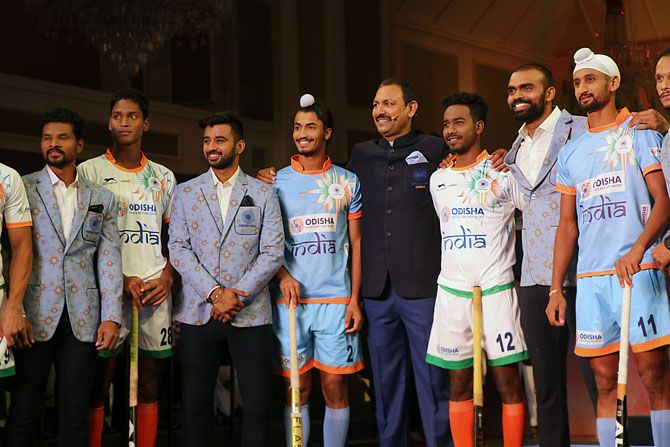'Whatever happened at the Asian Games, that's a big learning curve for the players, coach and the staff.'
All Photographs: Rajesh Karkera/Rediff.com
Text: PTI

The collection has been conceptualised by brand strategist Nupur Mahajan and designed by Narendra Kumar.
The Indian men's team fetched a rather disappointing bronze at the Asian Games after losing in a shoot-out to Malaysia in the semifinals.
India eventually defeated Pakistan for a bronze medal in the play-off.
The setback didn't just cost the team a shot at a second successive gold, but also direct qualification to the 2020 Olympics.

Asked if the side needed help to deal with pressure situations with professional help, Harendra was dismissive.
"Why do you need psychologists?" he asked.
"If gaining confidence is the aim, then you can even consult a commoner and take motivation from him," the coach said.
"The word psychologist itself carries a negative vibe and the players feel that they are doing something wrong for which they need to consult a psychologist," Harendra said on the sidelines of the team's jersey launch.
"I don't know that word. In any team the biggest psychologist is the coach and you yourself. If I'll not motivate myself, then no one in the world can motivate (me)," said Harendra.

Sandeep Singh, on whom the recent film Soorma was based, can be seen standing extreme left.
Harendra said it is the coach's job to ensure that the players' emotional needs are understood and addressed.
"...Rather than going and getting the help from a psychologist who has no clue about the team and sports, no clue about how the players behave," he explained.
As for the team's Asiad performance, Harendra described it as a bad memory and a learning curve.

The tagline of the event was 'My heart beats for hockey'.
"Look at the positive side, look at the data and then move to the World Cup, Whatever happened at the Asian Games, that's a big learning curve for the players, coach and the staff," Harendra said.
"...that should not be repeated, that is more important, whatever happened we can erase that bad memory when we do well in the World Cup," Harendra told reporters here referring to the premier tournament in December.

"They (the team) have a lot of positive things and if we move forward with that positive mindset," Harendra added, "we are mentally and physically capable of turning (things around)."












 © 2025
© 2025